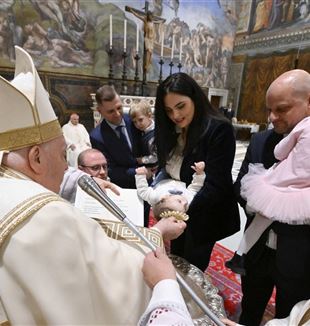
"Discovering the fascination of life”
The desire of young people to become parents, the uncertain reality that discourages it. Yet "giving birth to children and welcoming them is a 'taking care of the world'". A contribution by Luca Sommacal, President of Families for Hospitality.Motherhood as a “mission” and as the highest aspiration for young women. The current debate takes us directly to the heart of one of the most alarming and contradictory issues of our time: on the one hand the difficulty (sometimes actually the impossibility) of thinking about starting a family and maintaining a balance between motherhood and work, and on the other hand the worrying decline in birth rate and the aging population. But before that, perhaps we need to ask ourselves whether it might be better to talk about motherhood and fatherhood, that is, having children as a shared 'choice' between two people who decide to embark on the extraordinary adventure of being parents. In our experience as an association of adoptive and foster families, we meet many young couples who experience the great desire to have children and who develop a readiness to welcome an unborn child, to open the door to an unknown other, who unequivocally becomes an integral part of their lives. The journey towards this willingness deepens and enriches the generative dimension of the martial relationship: a relationship that develops as acceptance and openness beyond one's own limits.
For those who follow this path, it becomes increasingly clear that welcoming children and bringing them into the world is a great testimony of hope and a responsibility that does not only concern ourselves but projects us beyond: it is a ‘taking care of the world.’ The Pope's words in Amoris laetitia help us to understand the appeal of this perspective: "Through their union in love, the couple experiences the beauty of fatherhood and motherhood, and shares plans, trials, expectations and concerns; they learn care for one another and mutual forgiveness. In this love, they celebrate their happy moments and support each other in the difficult passages of their life together. [...] The beauty of this mutual, gratuitous gift, the joy which comes from a life that is born and the loving care of all family members – from toddlers to seniors – are just a few of the fruits which make the response to the vocation of the family unique and irreplaceable.” There is, therefore, a heritage of good that must be rediscovered, looked at anew, and valued. The objective difficulties that young people encounter today in trying to start a family, the penalties that working mothers still suffer, the lack of structural and permanent family policies must be considered and addressed. But in striving to overcome these obstacles, we must question the issue in its essence: to give birth to or raise children is to have the certainty of a good promise. It is to transmit hope about the future rather than fear or, worse, resignation in facing the uncertain. But how to do it? It cannot be imposed or applied as a mechanical formula; it is a trust that must be educated and matures as an experience first of all within the families themselves, which can – by contagion, by osmosis, by passion – rediscover themselves as places where generations cross, where life is open, a space for growth and sharing. So that the fascination of giving birth to and welcoming a child may increasingly reach young couples. It is an awareness that can mature more fully if it is accompanied by a friendly network between families that supports hope as a conception of the future, that bears witness to a possible human fullness and thus attracts and gives courage to welcome new lives.
*President of Families for Hospitality
Published in Avvenire on January 6, 2024